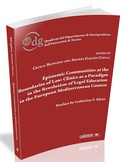Explore

Epistemic Communities at the Boundaries of Law
Cecilia Blengino and Andrés Gascón-Cuenca
2019
0 Ungluers have
Faved this Work
Login to Fave
“As richly described in the various chapters of this book, we see that clinics can act as a window to the functioning of law and the legal system.Clinics allow students and faculty to see how laws and the legal system are functioning for groups of people who otherwise likely would not be a part of the common experience of professors and their students: poor people generally, migrants and refugees, women and children exploited by trafficking, people with disabilities, ethnic minorities, prisoners, and so on. Legal systems the world over tend to give less care and attention to the problems of the poor and other disempowered groups, and such people usually lack access to well-educated legal advocates to help them fight to make the legal system work for them. Through clinic cases, students and faculty see the day-today lives of people marginalized by the society, see how the law affects and influences their lives, and see how it serves or fails to serve them. For law professors involved in clinical education, such as the authors of this book, heightened awareness of the law’s operation for poor people adds another important perspective to the subjects of their research and work as commentators on the law. Students can also be inspired to select topics for research papers, master or PhD theses by exposure to problems in the law and legal system as it functions for their clients.” (Dall’introduzione)
This book is included in DOAB.
Why read this book? Have your say.
You must be logged in to comment.
Rights Information
Are you the author or publisher of this work? If so, you can claim it as yours by registering as an Unglue.it rights holder.Downloads
This work has been downloaded 40 times via unglue.it ebook links.
- 40 - pdf (CC BY-NC-SA) at Unglue.it.
Keywords
No keywords yet.Editions

